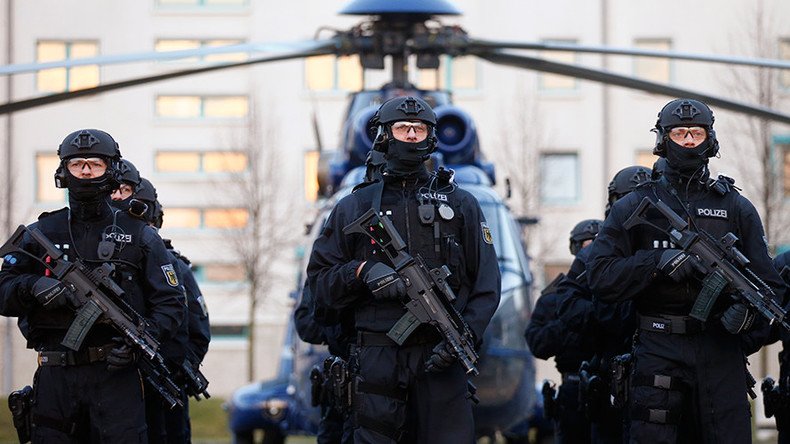Germany unveils new counter-terrorism unit in wake of France attacks

Germany has created a new counter-terrorism police unit that will have up to 250 agents. The move followed analysis by national security revealing that German officers are not trained to deal with Paris-style terrorist attacks.
The new unit has been named the Beweissicherungs- und Festnahmeeinheit plus (“Evidence collection and arrest unit plus”), also referred as “BFE+,” Interior Minister Thomas de Maiziere has announced.
“The danger in Germany from international terrorism is high, as it is across Europe,” de Maiziere said at a police base in Blumberg. “It was high, it is high, and it will remain high for the foreseeable future.”
There will be fifty agents assigned to the first team, which will start work at the federal police’s Blumenberg base near Berlin immediately.
Another four teams will be added later, each one consisting of 50 agents. The additional teams will be spread out throughout the country and placed only in those locations where the national police have access to helicopters, in order to speed up response times.
The special teams will not only be deployed in emergency response situations. They will also fulfill day-to-day operations and act as an intermediary between the police and the country’s elite GSG9 SWAT teams.
#Terrorists wanted to hit #GermanyNetherlands football match with 5-bomb attack - reports https://t.co/GtsPuoft65pic.twitter.com/QOr5qm1zaB
— RT Sport (@rtsportnews) November 21, 2015Previously, any terrorist situation was dealt with by GSG9 SWAT teams. However, those teams are trained strictly for direct attacks and not the kind of large-scale manhunts that were proven necessary after the Paris attacks.
In January, following the attack on the Charlie Hebdo satirical newspaper that killed 17 people, Maiziere commissioned a preparedness analysis of German security forces to see how ready they were for large-scale acts of terrorism on domestic soil.
The work on the new counter-terrorism police unit began after the findings showed there was need for improvement, as Germany officers lacked training and equipment.
“Europe had never experienced attacks like those in Paris this January,” said Jörg Radek, deputy chairman of the GdP police union. “We are faced with a new type of perpetrator, one that has been to war and knows how to handle military weapons. Until now, an attack would be carried out, then the perpetrator would go into hiding. But now perpetrators are moving, they are dynamic, and several attacks take place at different locations at the same time.”
This view was further confirmed on November 13, when multiple attacks unleashed in Paris killed 130 people.
'Paris changes everything’: Merkel’s allies call for German refugee policy changes https://t.co/nE2BOGDAeBpic.twitter.com/pUcCVtvof1
— RT (@RT_com) November 15, 2015Police union spokesman Rainer Wendt agreed that the new unit is “money well-spent,” but warned that authorities cannot forget about regular police officers, who are also in need of proper equipment, such as helmets and high-quality body armor. “It would be irresponsible to do nothing for the ordinary patrolman,” he told the dpa German press agency.
However, not all security experts agree. “We don’t need another unit,” corporate security advisor Wolfgang Petri told dpa, adding that officers will simply be moved from the old units into the new one. “It’s pure window dressing,” he said.












